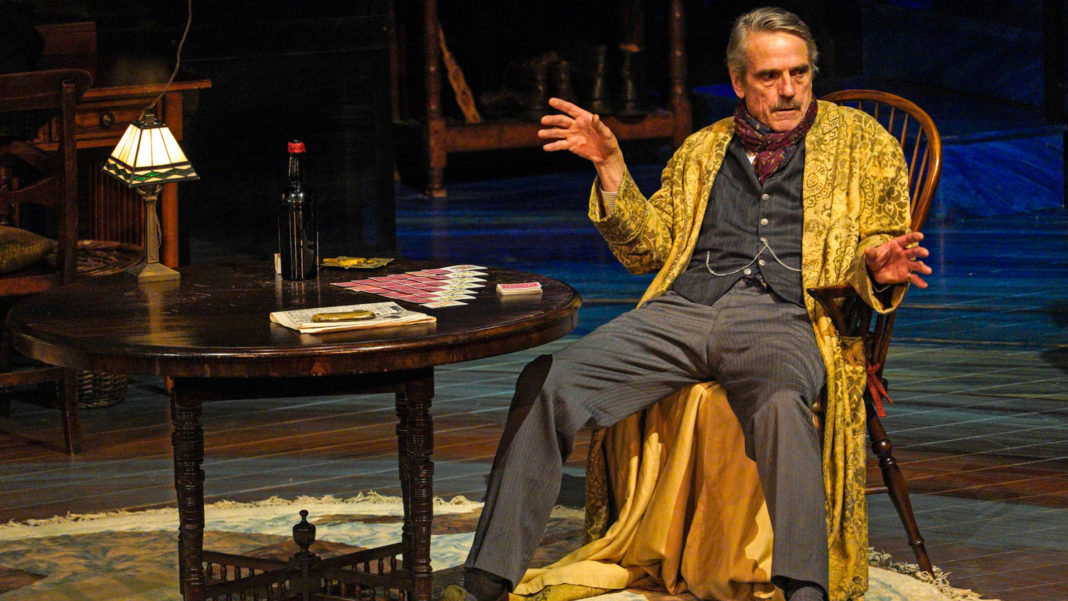When I posted the first part of my interview with actor Jeremy Irons last week, he said it was his desire to be challenged that informed his decision to play James Tyrone in Eugene O’Neill’s Long Day’s Journey Into Night. That production, which originated in England, is currently playing at the Wallis Annenberg Center for the Performing Arts through July 1st.
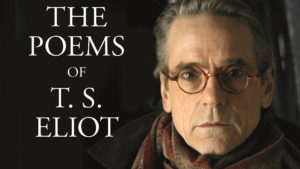
In part two of our interview we discuss another passion project for Irons. He recorded the poems of T.S. Eliot. Those recordings were originally broadcast on BBC Radio and they were recently released on CD to wide acclaim. Here he discusses these recordings, the woman who inspired his interest in poetry and whether awards have any real significance to him.
Josephine Hart is the Irish writer who wrote the novel Damage. Louis Malle turned that book into a film in 1992 and it starred Irons and Juliette Binoche. Hart would hold poetry readings at a gallery in London and she asked Irons to join them.
When Josephine Hart had you join these poetry readings, did it instill a passion for reading poetry and for Eliot’s work in particular?
It did. It instilled a passion for reading poetry. I’m not sure I had that. It made me realize that poetry, when read well aloud, can often be more affecting than when you are reading it on a page. She literally introduced me to Eliot. I think I’d read a bit, but it never jumped out to me. But when you read it out loud it begins to speak to you. In reading it and preparing a little bit, I never prepare too much, I found an affinity for it.
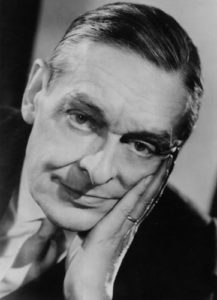
By Ellie Koczela – http://blog.bookstellyouwhy.com/t.-s.-eliot-nobel-laureate-and-voice-of-the-lost-generation, CC BY-SA 4.0, Link
How did that experience lead to the recording of Eliot’s work?
It was when Eliot’s widow, Valerie, she came to me after I had been reading some of her husband’s work and she said, “I think you seem to get him. I think you should read more of him.” We started recording with the BBC with The Waste Land and we asked Eileen [Atkins] to do the woman’s voice. Then I did the Four Quartets. And they asked “would you do everything?” I recorded, not absolutely everything, the best of his work. About 80% of it. And then I listened to it and I thought we’d done something good. We should push it further. We decided to put it all on CD.
How challenging were these readings for you?
For me the big ones are the Four Quartets. They are quite tough, quite difficult, but immensely satisfying and I was very pleased with the recording I did of that. [Eliot] opened up to me through studying the poems. I say study. I looked online to see lectures, normally American lectures, and I couldn’t believe how bad they were. They were talking about the technical aspects of it and some of the way he brings in other people’s ideas, thoughts and other people’s lines sometimes. I thought, yes, that’s true. But it doesn’t get to the heart of what he’s doing and what he chose to write about. He says in Four Quartets that words don’t do it. But we keep trying. I love that whole aspect of his quest for meaning and community and knowing he was failing all the time. I love that aspect of him.
These recordings have been very well received. It is conceivable you could get a Grammy nomination for them. If you won, you would become an EGOT having won three Primetime Emmy Awards, an Oscar for Reversal of Fortune, and a Tony Award for The Real Thing. Would that mean anything to you?
It would be quite fun. Does it mean anything? Not really. When I got the Oscar or the Tony, it was great. It was great. But it’s sort of like fame in general. What does it mean? It’s something to go on your CV.
You keep a CV?
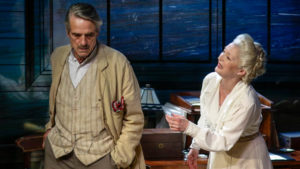
I have to provide something for theatre programs. Sally [Fischer, his publicist] has a CV. But no, they are nice. I suppose it’s sort of like money. If you have it, you take it for granted a bit. If you don’t have it, you want it. Awards are a bit like that. I watched Lesley [Manville – his co-star in Long Day’s Journey Into Night] as she was nominated for an Oscar [The Phantom Thread] and the excitement and all of that. I remember feeling like that. But it doesn’t change anything really. Your work is the moment you say a line at the time.
T.S. Eliot said “A play should give you something to think about. When I see a play and understand it the first time, then I know it can’t be much good.” I don’t know what Eliot thought of Long Day’s Journey Into Night, but it seems like this is precisely the kind of play he would like. In the process of doing this play, can you ever fully know it? Or is part of the journey to understand it more?
I would agree. And most of Shakespeare, too. That’s why this play is so good to do for an actor because there’s so much depth. How do you do the same thing every night? I don’t. I’m trying to get it right, get deeper, constantly working and it gives you the grist for that mill. We had a two-year break between doing it at Bristol and doing it at London. It had sort of marinated in my head in that time. When we got to London I think what we did was a lot better. Maybe in seven years time, if I come back it, I’ll be a different person and maybe I’ll find different things.
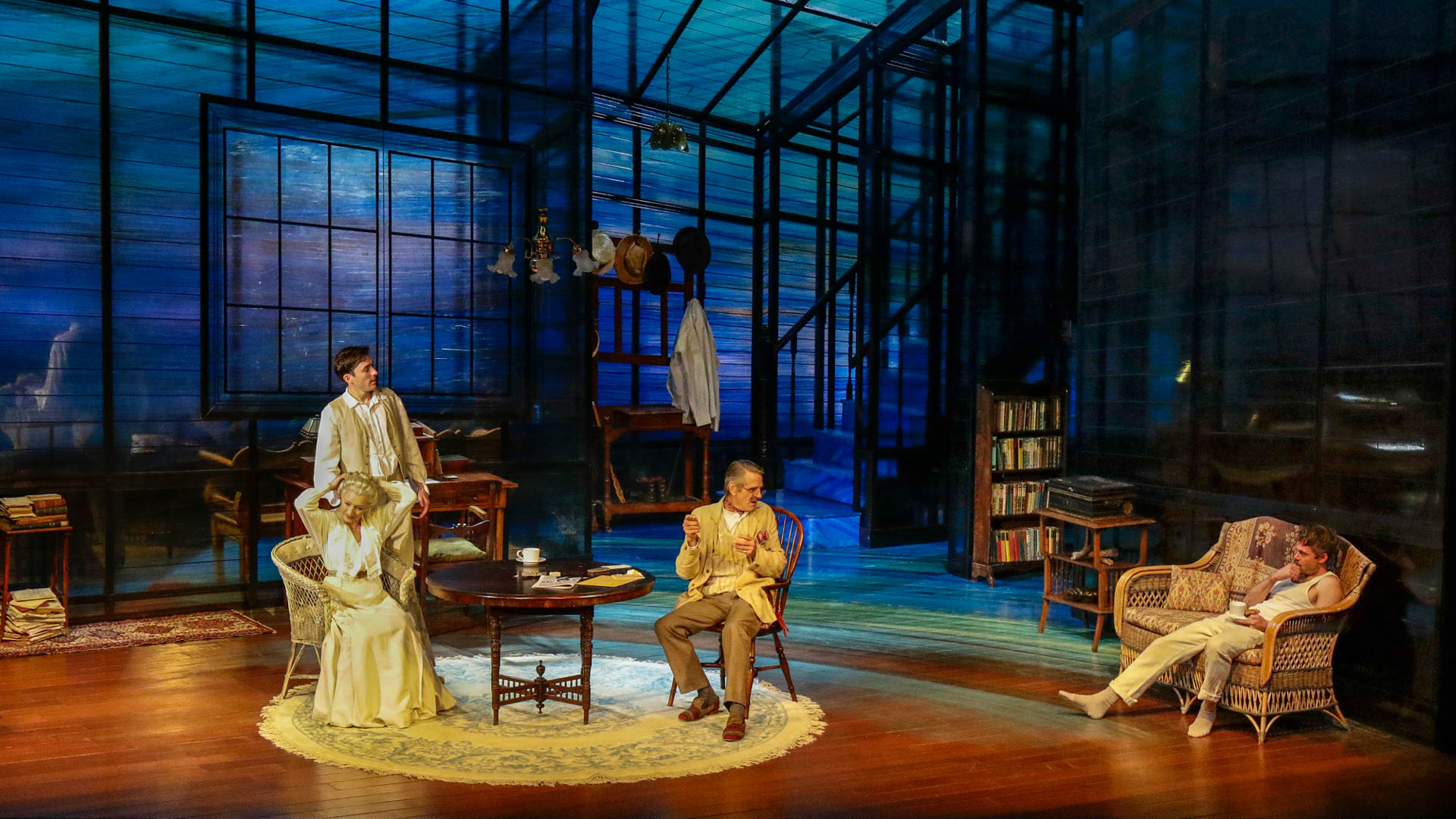
(Photo Credit: Lawrence K. Ho)
As an audience, you say you saw Brian Dennehy [Broadway – 2003], you’ll be a different person and it will affect you differently over and above there are different actors playing it. There’s no way to fully know this play or character. I’d have gotten to know him almost as best as I can.










